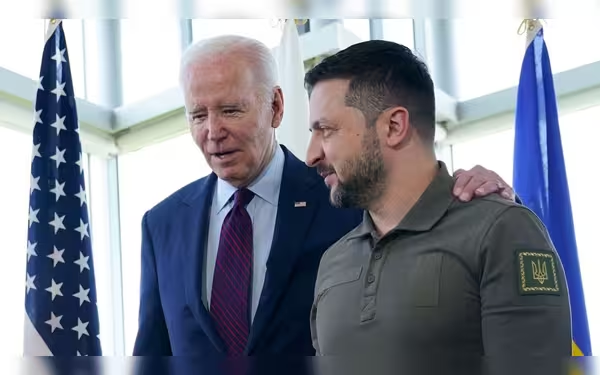Saturday, November 16, 2024 07:27 PM
Zelensky Seeks U.S. Troops for Ukraine Support
- Zelensky demands U.S. military assistance in Ukraine.
- Long-range missiles proposed to pressure Russia.
- Upcoming U.S. elections could influence troop deployment.
 Image Credits: asiatimes
Image Credits: asiatimesUkrainian President Zelensky seeks U.S. troop deployment amid ongoing conflict with Russia, emphasizing military aid and peace negotiations.
Ukrainian President Volodymyr Zelensky has been making headlines recently, particularly with his impassioned speech at the United Nations. His message was clear: he wants to see an end to the ongoing conflict with Russia, and he is looking for support from the United States and NATO. The situation in Ukraine has been dire since Russia's invasion, and Zelensky believes that international military assistance is crucial for his country's survival.
In his speech, Zelensky outlined several key points that he feels are essential for achieving peace. He called for Russia to return all territories it has taken from Ukraine, a war crimes trial for Russian President Vladimir Putin and his associates, and an increase in military aid, including weapons and financial support. However, beneath these demands lies a more ambitious goal: Zelensky is actively seeking the deployment of U.S. troops to Ukraine.
To achieve this, Zelensky has been campaigning in U.S. swing states, particularly Pennsylvania, where he is focusing on garnering support for Vice President Kamala Harris. He understands that the deployment of American troops is contingent upon the outcome of the upcoming elections. If Harris wins, it could pave the way for a stronger military presence in Ukraine.
But how does Zelensky plan to force Russia to the negotiating table? His strategy involves providing Ukraine with long-range missiles capable of striking deep into Russian territory. This would not only damage critical infrastructure but also lead to significant civilian casualties, which could, in turn, weaken Putin's position at home. The underlying belief is that a weakened Putin could lead to a change in leadership in Russia, potentially resulting in a more reasonable government.
Supporters of this strategy, including military intelligence officials in Ukraine and some allies in the United Kingdom, are citing recent events, such as the death of former Wagner leader Yevgeny Prigozhin, as evidence that change is possible in Russia. Prigozhin's demise followed a brief rebellion against Putin, highlighting the fragility of the Russian leadership.
As the situation continues to evolve, it is essential to consider the broader implications of Zelensky's requests. The potential involvement of U.S. troops in Ukraine raises questions about international relations, military strategy, and the long-term consequences of such actions. While the desire for peace and stability in Ukraine is commendable, the path to achieving it is fraught with challenges and risks. The world watches closely as Zelensky navigates this complex landscape, hoping for a resolution that brings an end to the suffering of the Ukrainian people.













